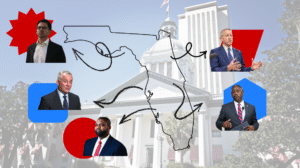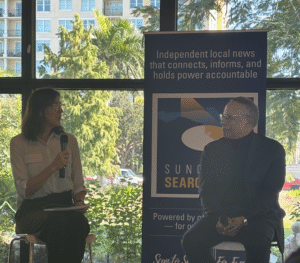The Florida Legislative Session—in swing this year from March to May—is once again taking on the culture wars in education. Since 2022, these sessions have spawned bills focused on public education that have catered to the recent conservative political movement known as “anti-woke culture”—and that have arguably set the stage for our current political climate nationwide.
“We will never, ever surrender to the woke mob,” Florida Gov. Ron DeSantis stated during his now-infamous 2022 reelection victory speech. “Florida is where woke goes to die.”
Now in 2025, much of Florida’s anti-woke legislation that reigned supreme just a few short years ago has either been significantly defanged by successful lawsuits, or is actively being fought in court today.
But despite this pushback, fighting “wokeness” in education appears to still be a priority for some members of the Florida government this year—and so is undoing the influence of “anti-woke culture” for others. Here are four bills about education to keep an eye on over the next month.
HB 855 — Banning undocumented students from higher education
What It Says
HB 855, or “Postsecondary Education” creates a new section of Florida Statutes that states in full, “A Florida College System institution or a state university may not accept the application of or admit an individual who is undocumented for federal immigration purposes.”
Why It Matters
HB 855 runs contrary to a landmark Supreme Court case, Plyler v. Doe (1982), which established that undocumented immigrants still maintain equal access to public education under the 14th Amendment of the U.S. Constitution.
However, this is not the only time that the Florida legislature has considered, or even passed, constitutionally dubious legislation, and some laws in recent years have been deemed unconstitutional by federal judges. For example, HB 7, or the “Stop WOKE Act,” passed into law in 2022 but has since been permanently blocked from applying to places of employment, and is also currently blocked in higher education for committing the “greatest First Amendment sin,” in the words of the federal judge who made both rulings.
Will It Pass?
While short and simplistic, HB 855 is a drop of water in the current wave of anti-immigration legislative action hitting the state. Florida also ended in-state tuition for undocumented students in February, and the state legislature attempted to pass the Tackling and Reforming Unlawful Migration Policy (TRUMP) Act in January. The TRUMP Act would have increased penalties for noncitizen voting and for crimes committed by noncitizens, but it failed to pass after DeSantis vetoed it for “[stripping] immigration enforcement power from the governor.”
If the popularity of anti-immigration action under the current Republican presidential administration is any indication, HB 855 seems likely to pass through the Republican-majority Florida legislature. However, groups like the American Civil Liberties Union (ACLU) of Florida have indicated that, if it passes, they will pursue legal action against HB 855.
SB 100 — “Don’t Display Gay”
What It Says
SB 100’s official name is “Display of Flags by Governmental Entities,” but it has been given the nickname “Don’t Display Gay” by LGBTQ+ advocacy organizations in Florida. SB 100 states that, “A governmental entity may not erect or display a flag that represents a political viewpoint.”
The bill then lists “public schools, public colleges and public universities” in its definition of “governmental entities”—in fact, those are the only examples of governmental entities that the bill gives. And, in its definition of “political viewpoints,” SB 100 lists “racial, sexual orientation and gender.” Therefore, critics of the bill claim that the true goal of SB 100 is to specifically ban Pride flags, Black Lives Matter flags and Palestinian flags from public schools, colleges campuses and universities.
Why It Matters
SB 100 aligns closely with Florida’s most infamous “anti-woke” laws in recent history, laws that aim to ban instruction and resources related to race, gender, human sexuality and LGBTQ+ peoples and identities in public schools—such as HB 1557 (2022), or the “Don’t Say Gay” law that SB 100 is nicknamed after.
Will It Pass?
SB 100 was also being considered by the Florida legislature last year as SB 1120 before it died in a subcommittee on Governmental Oversight and Accountability. SB 1120 (2024) and SB 100 (2025) are identical, with the only major difference being that this year, the bill is being sponsored by Sen. Randy Fine (R), who has a reputation for being beloved by Trump but for butting heads with DeSantis. Fine also recently won a seat in Congress following the April 1 Special Election, winning by 14 points—and continuing to earn criticism from DeSantis.
Fine is also the Chair of the Governmental Oversight and Accountability Subcommittee this year, which voted 5-2 to approve of SB 100 and pass it along to the Senate for consideration. Whether Fine’s sponsorship will be the push SB 100 needs to pass into law remains to be seen.
HB 811 — “Freedom to Learn Act”
What It Says
HB 811 or “Education”—or the “Freedom to Learn Act”—primarily removes language from existing statutes that were put in place by the Stop WOKE Act, the “Don’t Say Gay” law, and two other bills passed in 2023: HB 1069 and SB 266, the former of which has been criticized for leading to mass book bannings in Florida, and the latter of which prohibits college and university funding for programs, activities or initiatives related to diversity, equity and inclusion (DEI).
The language removed includes:
- The ban on content that could potentially cause “guilt, anguish, or other forms of psychological distress because of actions, in which the person played no part, committed in the past by other members of the same race, color, national origin, or sex” from K-20 classrooms or workplace environments.
- The ban on classroom instruction on sexual orientation or gender identity in prekindergarten through eighth grade.
- The ban on classroom instruction or curriculum that “teaches identity politics [or] is based on theories that systemic racism, sexism, oppression, and privilege are inherent in the institutions of the United States and were created to maintain social, political, and economic inequities.”
HB 811 also adds a section that states, “School libraries may provide materials and information presenting all points of view on current and historical issues. Materials may not be proscribed or removed because of partisan or doctrinal disapproval.”
Why It Matters
HB 811 removes from Florida law language that has, in recent years, been challenged in federal court for violating the First Amendment. The “Stop WOKE Act” has been blocked twice, and the “Don’t Say Gay” law reached a settlement in 2024 that reversed the provisions of that law that banned books and non-instructional discussion about LGBTQ+ identities and topics.
Will It Pass?
HB 811 tackles some of the most controversial Florida laws in recent years, but they are also pillars of DeSantis’ “anti-woke” platform. HB 811 would need bipartisan support in order to pass, and it remains to be seen whether members of the Republican party would be willing to bite, following the recent difficulties that supporting the culture war has faced in court.
HB 609 — Removing “political influence” from universities
What It Says
HB 609, “Public Postsecondary Academic Freedom,” is deceptively simple: It changes the state-sanctioned definition of intellectual freedom and viewpoint diversity by removing the word “shield” and the language that defines it.
Under Section 1001.03, the word “shield” was included to mean “[limiting] students’, faculty members’ or staff members’ access to, or observation of, ideas and opinions that they may find uncomfortable, unwelcome, disagreeable or offensive.” HB 609 then adds in the stipulation that the Florida Board of Education must ensure that state colleges and universities are “free from undue political influence and interference in academic affairs.”
Why It Matters
This original definition of intellectual freedom and viewpoint diversity, which has included shielding students from “uncomfortable” ideas, has been the impetus for laws like the Stop WOKE Act and SB 266, which seek to eliminate DEI in higher education.
Will It Pass?
Much like HB 811, this bill will need bipartisan support in order to pass into law.
For a bill to pass into law, it must first be approved by various subcommittees related to the bill’s topic. If the bill survives each of these subcommittee hearings, it is then heard by the Senate or the House of Representatives, depending on whether it is a Senate bill (SB) or a House bill (HB). If approved, it reaches the Governor’s desk, who can ultimately decide to pass or veto the bill.
As of the date of publication, HB 855 has reached the House of Representatives, but has not been scheduled for a hearing yet. SB 100 has successfully passed through the Governmental Oversight & Accountability and the Community Affairs subcommittees, and is now onto the Rules Committee—the final committee it needs to pass through before being heard in the Senate.
HB 811 and HB 609 have also both made it to the House of Representatives, but have not been heard yet.
You can keep tabs on these bills and more at the Florida Senate website.
Sophia Brown is the Program Coordinator for PEN America’s Florida office.




